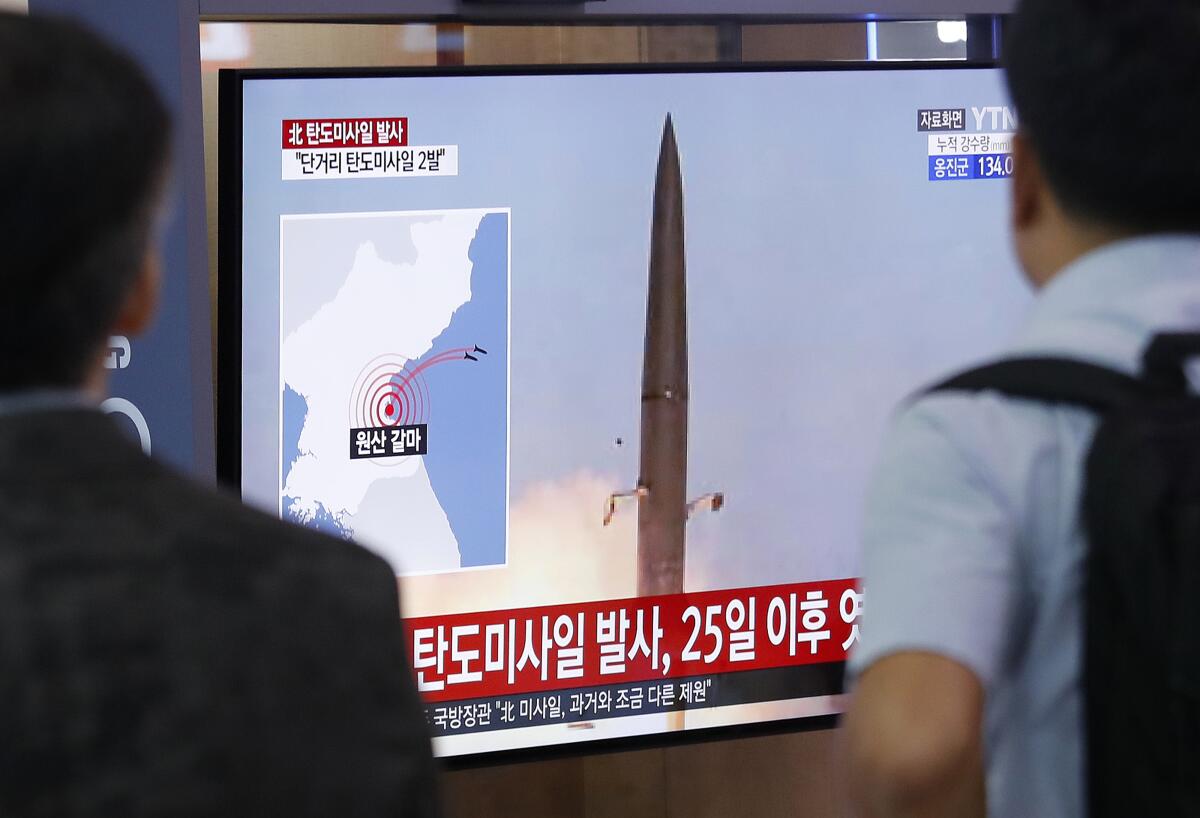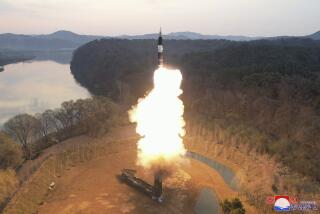North Korea turns up the heat with repeat weapons tests as U.S. downplays risk

SEOUL — North Korean leader Kim Jong Un called his recent weapons tests an important advance for the country’s arsenal and a demonstration of power designed to “send a solemn warning” to South Korea.
President Trump called the weapons in question “very standard missiles,” ones “many people have.”
The difference in those characterizations — with Kim playing up the tests, and Trump playing them down — raises the question of just how much the U.S. is willing to tolerate to keep alive the hope of resuming nuclear talks between the two countries after a months-long impasse.
The firing of a large-caliber guided rocket system on Wednesday was North Korea’s second weapons test in less than a week. Just six days earlier, it launched two short-range ballistic missiles into the sea off its east coast.
Two days before that, North Korean state media showed off a submarine that the South Korean military said was probably designed to carry three ballistic missiles capable of being launched from the ocean.
It has been just a month since Kim and Trump shook hands at an impromptu meeting in the demilitarized zone between the two Koreas and, according to Trump, agreed to get working-level talks going in a matter of weeks.
The nuclear negotiations have been on ice since talks fell apart at Trump and Kim’s second meeting in February. At the time, the two sides said they were too far apart when it came to North Korea’s demands for removal of economic sanctions and the parts of its nuclear program it was willing to put on the table.
U.S. Secretary of State Michael R. Pompeo told reporters this week that North Korea has yet to appoint a negotiator to head up renewed talks. Its previous top envoy, who laid the groundwork for the Vietnam summit in February, has reportedly fallen out of favor over that meeting’s failure.
North Korea resumed weapons testing a few months after Kim returned empty-handed from his meeting with Trump in Hanoi, breaking an 18-month freeze. At the same time, North Korea has stayed away from nuclear detonations or testing of intercontinental ballistic missiles, as it had done in 2017.
Trump and his staff, including Pompeo and national security advisor John Bolton, have repeatedly emphasized that Kim has not broken his pledge to refrain from nuclear and intercontinental ballistic missile testing. The lower-level provocations, Pompeo said in interviews last week, were understandable posturing ahead of resuming talks.
“Look, everybody tries to get ready for negotiations and create leverage, and create risk for the other side,” he told Bloomberg TV. “President Trump has been incredibly consistent here. We want diplomacy to work.”
Shin Beom-chul, director of the Center for Security and Unification at the Seoul-based Asan Institute for Policy Studies, said North Korea was upping the ante with the United States, with the expectation that as the U.S. presidential race heats up in coming months, Trump will feel pressure to produce results from his personal diplomacy with Kim.
He said that Trump’s decision to meet with Kim in June, after missile tests the previous month, seemed to signal that provocation brings the U.S. to the negotiating table.
As for remarks by Trump and Pompeo downplaying the risk of short-range missiles, Shin said that “from North Korea’s perspective, it’s given them a free pass to continue firing missiles.”
In statements about its weapons tests, North Korea has also lambasted upcoming joint military exercises between South Korea and the U.S. that are expected to take place in August. Kim warned South Korea that the exercises were a “suicidal act” and that the South Korean president should not make the “mistake of ignoring the warning from Pyongyang,” according a Foreign Ministry statement.
Bolton said after Pyongyang’s latest round of testing this week that the ball was in North Korea’s court.
“You have to ask when the real diplomacy is going to begin, when the working-level discussions on denuclearization will begin,” he told Fox Business. “We’re still waiting to hear from North Korea.”
More to Read
Sign up for Essential California
The most important California stories and recommendations in your inbox every morning.
You may occasionally receive promotional content from the Los Angeles Times.











